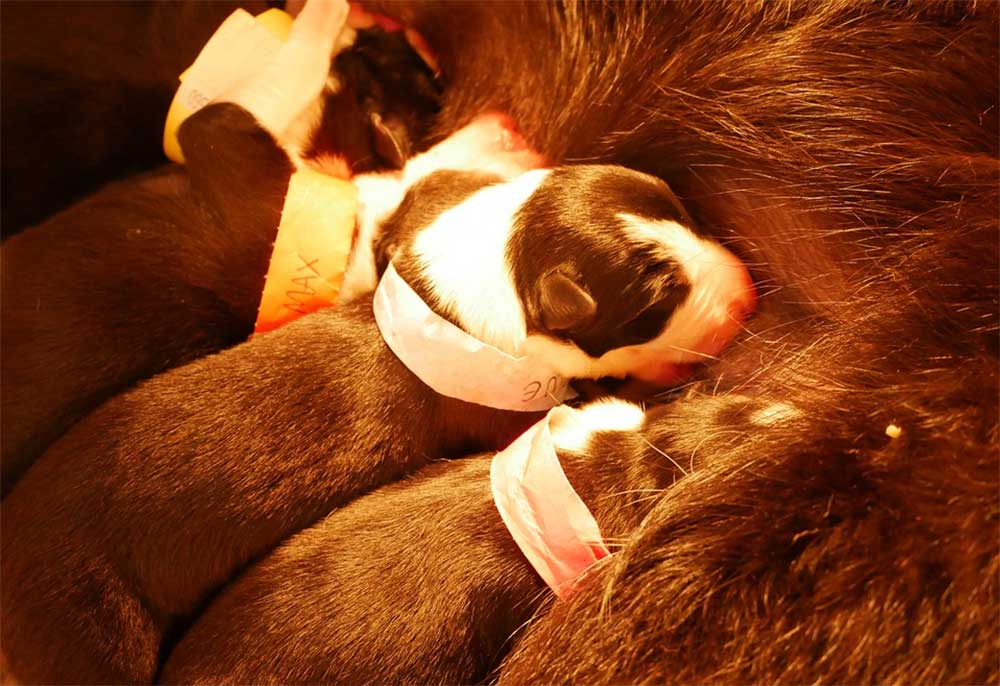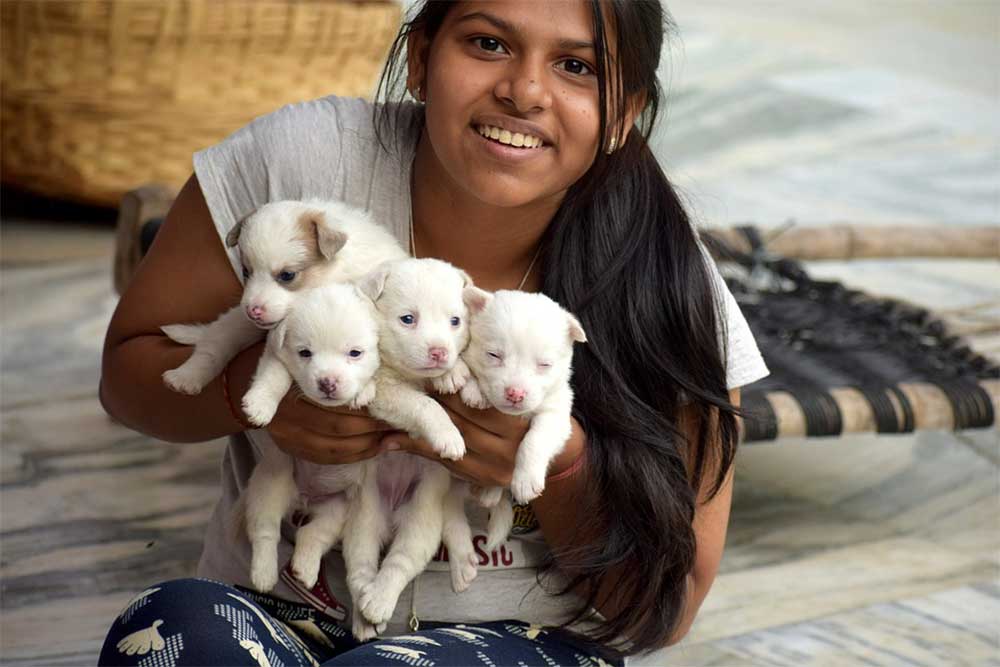Everyone loves a puppy. Their adorable smushed faces, nuzzling little mouths, and tiny toe beans makes most people squeal with delight on sight.
It seems to be wired into our instincts to want to cuddle and care for them. But we need to consider the pups’ health over our desires.
There is confusion and conflict around handling newborn puppies. Many people are confused about when it is appropriate to hold them, how you should hold them, and under what circumstances it’s ok to hold them.
To help you be the best dog parent, or grandparent, ever, we’ve done the research on handling newborn puppies and compiled this guide.

When Should You Handle Newborns?
There is a lot of discussion around this topic. Some people believe you shouldn’t handle puppies under 3 or 4 weeks. However, this is somewhat of a misunderstanding.
You see, at about 4 weeks of age, puppies need to start socializing with humans and other dogs. This is when you can start playing with them and spend prolonged periods with them.
Under 4 weeks, puppies are too dependent on their mothers to spend time socializing. Removing them and handling them too much at this point can be dangerous.
However, the keywords here are ‘too much.’
If you are the owner and carer, you will need to handle the puppies daily from the moment of birth.
You’re not handling the puppies for fun or a cuddle. Instead, handling at this stage is for a few specific reasons.
-
Weighing
The main way to make sure your puppies are well and thriving, is by monitoring their weight.
You need to weigh the puppies every day, so you’ll need to remove them from their mother for a few minutes each day.
Daily weighing should happen for the first week. If the pups are gaining weight steadily and appear happy and healthy, you can reduce the weighing to once a week.
Any smaller, runty, or sickly puppies will need to continue daily weighing until they catch up to their siblings.
-
Cleaning
The mother will keep on top of cleaning the puppies, so you don’t have to. In fact, during the first 3 weeks of life, you shouldn’t bathe the puppies unless they are particularly dirty.
What you will need to clean is the whelping box and pen. Puppies are extremely sensitive to germs and bacteria. They can pick up infections and illnesses all too easy. Hence, it is crucial that the whelping box be cleaned daily.
Naturally, puppies have poor control over their bladder and bowels which is why the whelping box needs daily cleaning.
When cleaning the box, you’ll need to remove both mother and her puppies. Your dog might be wary of leaving her pups, so you may need to use a leash to lead her.
The puppies will need to be lifted gently out of the whelping box while you change the blankets and bedding.
-
Helping them Feed
Puppies instinctively find their mother’s teat even though they are blind and deaf for the first two weeks of their life. However, sometimes puppies get a bit lost or get knocked off course by their siblings.
If you notice a puppy struggling to find mum, or crying because they are lost, you should lift them back into place.
They need to stay close to mum for warmth and food for the first few weeks. That is why moving them back into place if they get lost is so important.
If a pup seems weak and is struggling to eat, you want to lift them to the back teats and wait for them to latch on. The teats between the back legs generally give the most milk and so will help the hungry pup.
-
Medical Emergencies
While you want to try and avoid removing puppies from their mother for too long, it may be necessary in some cases.
If the puppy is unwell, weak, or struggling to thrive, it is important that you get the pup to a vet. In these situations, it is more important for the pup to receive medical attention than its closeness to mom.
How to Handle Puppies
Puppies need to be handled very gently for the first few weeks of their life. They are fragile little things and very unsteady on their feet.
You need to hold them gently and carefully to keep them safe. This means handling them softly, protecting against falls and bumps, and only handling when necessary.
Before you pick up the puppies make sure you wash your hands thoroughly. You don’t want to pass on any germs or bacteria to the pups.
Try not to use heavily scented soaps because you don’t want to leave a scent on the pup. This can confuse and stress mum.
To lift, slide your hand gently under their belly and scoop them towards your chest. You’ll also need to place a hand under their bum as they get slightly larger.
Once in your hand, you need to secure them. Puppies are blind and deaf for the first two weeks of their life, so they wriggle around with no sense of direction.
Keep the puppies close to your chest while you carry them and hold them. They should snuggle into you for warmth and safety.
When you hold the pup in your hand, take some time to look at what it does. Healthy, happy puppies will instinctively curl up in your hand to stay warm.
It may be too cold if the puppy lays flat with little or no inclination to curl up. You need to take steps to warm the puppy if they are chilled.
If you put the puppy down on a surface, like the scales, keep a hand close by to stop or catch any errant wrigglers!
Older puppies might be good at rough and tumble, but newborn pups are too frail to take rough handling or falls of any significance.
You have to ensure that they don’t take falls or bumps. Before you lift or carry the puppies, make sure you clear a path to your destination. Also, take care when climbing in and out of the whelping box.
Whelping boxes need to be tall enough to stop the puppies climbing out but low enough for you to easily get in and out.
Why So Cautious?

Understandably, you might wonder why you have to be so cautious and careful about holding young puppies. After all, newborn babies are often passed between relatives like a game of pass the parcel.
The thing to remember about puppies is that they are not babies, and you are not their mom.
Puppies develop differently and have different milestones. You need to facilitate their growth and development, much of which depends on mom.
Many people are worried or nervous about handling puppies in case the mother then decides to reject the pup. This is a fear based on the behavior of wild animals; however, it doesn’t ring true for pet dogs.
Handling puppies almost never results in the mother rejecting the pup. Mom dogs are very protective of their pups, but they usually let their owners interact with and handle the pups.
You need to be cautious about handling pups because they depend highly on their moms. Too much time apart can be dangerous for a few reasons.
-
Body Heat
One of the most important things to know about newborn pups is that they cannot regulate their body heat. They depend on their mother and their siblings to get warm and stay warm.
If you take a pup out of the whelping box, it can very quickly become chilled. When chilled, puppies stop suckling and are at risk of choking and regurgitating.
You’ll know when a puppy is chilled because they become very whiny and vocal. They also become sluggish and stiff in their movements.
-
Mother
The puppies’ health and wellbeing are obviously important; however, you also need to think about mom.
Naturally, mom dogs are going to be protective of their pups. You might notice that she is unwilling to leave the pups even to go to the bathroom or that she becomes agitated if you attempt to remove the puppies.
This protectiveness is healthy in small doses. You will need to get mom used to being separated from the pups to avoid issues in later life. It’s also crucial that you can inspect and check the pups daily.
When you go to remove a puppy, you need to move slowly and calmly. Try to be as unobtrusive and nonthreatening as possible.
If mom shows signs of stress or seems to be on edge, come back later. You don’t want to further stress her out by taking a pup.
Never remove a pup if mom is cleaning them, or if they are nursing. These things need to happen; they are important bonding moments for the puppy and mom.
-
Size
One of the major concerns about handling puppies is their size and strength. They have fragile bones and bodies at this age.
When you lift them, you are raising them higher which naturally puts them at risk of falling.
You never want to leave puppies unattended on a raised surface. This is mostly a concern when weighing them.
To control the situation, remove only one pup at a time and limit distractions. You also want to make sure you remove any trip hazards or obstacles from your path before you start to move.
Socializing
At about 4 weeks, puppies are ready to start socializing with humans and other puppies. From this point on, you can start holding them more frequently and for longer.
At about 2 weeks, the breeder should hold them for about a minute or two a day. By 4 weeks this should be increased to at least 5 minutes a day. This time allows the puppies to become used to human smells and used to the feeling of being handled.
Between 4- and 16-weeks puppies need to be exposed to other people and pets. They should meet children, other pets, and other humans. Wherever possible, try to make these interactions positive and productive.
These meetings will be key to the pups’ tolerance and temperament as they age. Negative interactions can leave a lasting imprint on the puppies.
Final Thoughts
The bottom line here is that you can handle puppies from birth, but you need to be gentle. You don’t want to remove them for long, but you will have to handle them to keep an eye on their weight, health, and cleanliness.
